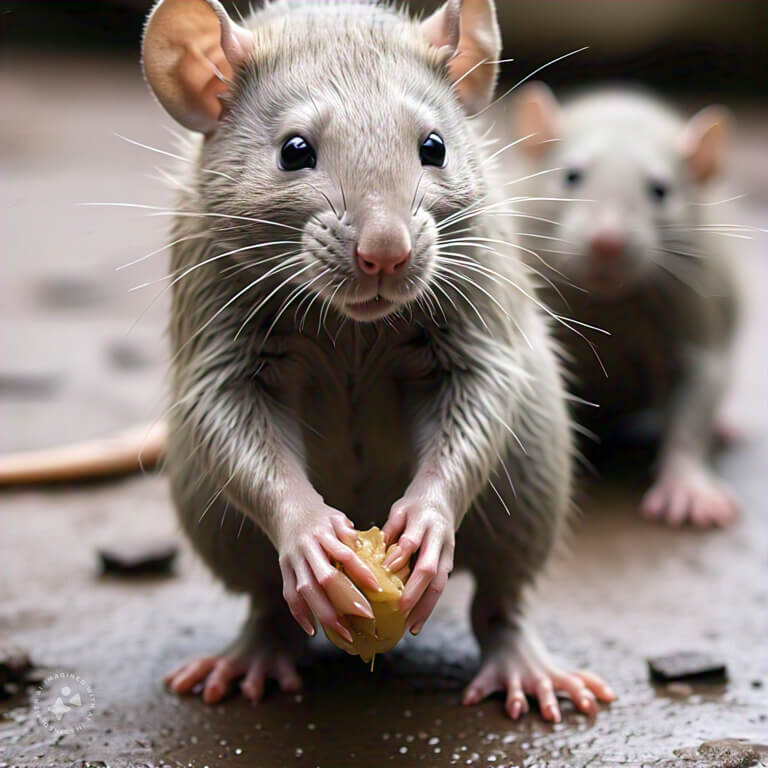Unraveling the Mystery: Common Causes of Scabs on Your Rat’s Back
Rats are charming and intelligent pets, but like all animals, they can sometimes face health issues that worry their owners. One such issue is the appearance of scabs on their back. This article explores the common causes of these scabs, providing insights into the possible health implications and what you can do to help your furry friend.
Identifying the Problem: What Do Scabs on a Rat’s Back Look Like?
Scabs on a rat’s back are usually crusty, raised patches that can vary in size and number. They often appear red or brown and might be surrounded by hair loss or appear flaky. If your rat is continuously scratching or biting these areas, it’s a sign that the scabs are bothersome and possibly painful.
Common Causes of Scabs in Rats
Parasitic Infestations: The Culprit Behind Itchy Skin
One of the most common reasons for scabs on a rat’s back is an infestation of parasites such as mites or lice. These tiny pests can cause extreme itchiness, leading to scratching and biting that results in scab formation. Regular cleaning of your rat’s habitat and vet-recommended treatments can help manage these parasites.
Allergies: A Reaction to the Environment or Diet
Rats, like humans, can develop allergies to certain foods, bedding, or environmental factors. These allergies can manifest as dermatological reactions including scabs. Observing any dietary changes or shifts in your rat’s environment can be key to determining if allergies are the cause.
Fungal Infections: More Than Just Surface Deep
Fungal infections such as ringworm can affect rats, leading to skin lesions and scabs. These infections require specific antifungal treatments as they can easily spread to other pets and even humans.
Bacterial Infections: Complications from Scratching
Persistent scratching can lead to secondary bacterial infections at the site of the scabs. These are usually treated with antibiotics and require cleanliness to prevent further issues.
Preventing and Treating Scabs on Your Rat’s Back

Consult a Veterinarian
Always consult a veterinarian if your rat develops scabs. Proper diagnosis and treatment are crucial to resolving underlying health issues and ensuring the welfare of your pet.
Maintain Cleanliness
Regularly cleaning your rat’s cage and changing out bedding to keep their environment clean can prevent many skin problems. Using dust-free and hypoallergenic bedding can also help avoid irritations.
Proper Diet and Care
Ensure your rat has a balanced diet and avoid known allergens. A healthy diet supports a strong immune system, reducing the likelihood of skin issues.
Regular Health Checks
Keeping an eye on your rat’s skin regularly and checking for any signs of pests, wounds, or changes can help catch any issues early before they develop into more serious conditions.
Conclusion: Keep Your Rat Happy and Healthy
Understanding and addressing the common causes of scabs on your rat’s back is vital for their health and comfort. With the right care and prompt medical attention when needed, you can help ensure your rat remains a happy, healthy companion for years to come.
Is Your Rat Itchy? Exploring Parasites and Skin Conditions in Rats
If you’ve noticed your rat scratching more than usual or spotted scabs and rough patches on its skin, you might be dealing with a health issue that requires immediate attention. Rats are prone to various skin conditions and parasites that can cause discomfort and health problems. This article delves into the common culprits behind these symptoms and offers guidance on when to seek veterinary care.
Understanding the Common Causes of Itchiness in Rats
Parasitic Infestations: One of the most frequent causes of itchiness and skin disturbances in rats is an infestation of parasites. Mites and lice are the primary offenders. Mites, such as the ones causing mange, burrow into the skin causing intense itching and scaly skin. Lice, on the other hand, are external parasites that feed on the rat’s blood, leading to irritation and patchy hair loss.
Fungal Infections: Ringworm, a fungal infection, can also affect rats, leading to circular, scaly patches on the skin. Although the name suggests otherwise, no actual worm is involved. This condition is contagious and can spread to other pets and even humans, so early diagnosis and treatment are crucial.
Allergic Reactions: Like humans, rats can have allergies that manifest in their skin. Allergens can include bedding material, diet, or other environmental factors. Symptoms typically include redness, swelling, and itchy skin.
Nutritional Deficiencies: A lack of certain nutrients, like vitamins and minerals, can lead to skin problems in rats. Poor coat quality, hair loss, and increased susceptibility to skin infections may be signs that your rat’s diet needs adjustment.
When to Consult a Veterinarian
Recognizing when to seek professional help is vital for the health of your pet rat. If you notice any of the following symptoms, consult a veterinarian:
- Persistent scratching
- Visible parasites on the skin
- Hair loss, bald patches
- Scabs and open sores
- Changes in skin color or texture
Prevention and Treatment of Skin Conditions
Maintaining Cleanliness: Regular cleaning of your rat’s cage and changing out bedding frequently can prevent many skin issues. Choose hypoallergenic and dust-free bedding to reduce the risk of allergies.
Proper Nutrition: Ensure your rat’s diet is balanced and meets all its nutritional needs. Supplements may be necessary if a deficiency is detected.
Parasite Control: Regular treatments with vet-approved anti-parasitic medications can help control mite and lice populations.
Conclusion
The well-being of your pet rat largely depends on the care and attention you provide. Recognizing the signs of skin conditions and parasites and responding promptly will help ensure your rat remains healthy and comfortable. Always consult with a veterinarian for an accurate diagnosis and treatment plan tailored to your rat’s specific needs.
Scabs on Rat’s Back: Signs, Symptoms, and When to See a Vet
When it comes to pet care, observing any changes in your rat’s physical condition is crucial for maintaining their health. Scabs on the back of a rat can be a cause for concern, signaling various underlying health issues. In this article, we’ll explore the signs and symptoms of this condition, possible causes, and when it’s essential to consult a veterinarian.
Identifying Scabs on Your Rat’s Back
Scabs are typically dry, crusty lesions that can appear on your rat’s skin due to various reasons, including parasites, allergies, or infections. To identify these, look for patches of rough, thickened skin that may be accompanied by hair loss. Rats might also exhibit signs of discomfort, such as scratching or biting the affected area excessively.
Common Causes of Scabs on Rats
Several factors can lead to the development of scabs on your rat’s back:
- Parasites: Mites and lice are the most common parasites that cause scabbing and skin irritation in rats.
- Allergies: Allergic reactions to bedding, food, or environmental irritants can also cause skin issues.
- Infections: Bacterial or fungal infections can complicate or cause skin lesions.
When to Consult Your Veterinarian
It’s essential to monitor the severity and persistence of scabs. If you notice any of the following symptoms, it’s time to see a vet:
- Persistent Itching: If your rat continues to scratch or bite at the scabs, indicating severe discomfort.
- Spread of Scabs: If new scabs develop or existing ones spread to other parts of the body.
- Behavioral Changes: Such as lethargy or a decrease in appetite, which can indicate a more serious underlying issue.
Prevention and Treatment
Preventive measures include maintaining a clean living environment, using hypoallergenic bedding, and regular parasite control. Treatment will depend on the underlying cause but may include:
- Medicated Shampoos: To treat and soothe irritated skin.
- Antibiotics or Antifungal Medications: If a bacterial or fungal infection is present.
- Parasite Control Treatments: To eliminate mites or lice.
Regular check-ups with a veterinarian can help catch and treat these issues before they become more serious, ensuring your rat remains healthy and comfortable.
By understanding the signs, symptoms, and necessary actions to take when scabs appear on your rat’s back, you can provide better care and potentially prevent more severe health issues.
Preventive Measures and Treatments for Skin Issues in Rats
Rats make delightful pets, but just like other animals, they can experience skin issues that may cause discomfort or health problems. Understanding how to prevent these issues and what treatments are available can help you ensure your furry friend stays happy and healthy.
Understanding Common Skin Problems in Rats
Before diving into preventive measures, it’s essential to know what might be causing skin issues in rats. Common problems include parasitic infestations like mites or lice, fungal infections, and environmental factors that lead to dry skin or allergies. Each condition has its symptoms, but scabs, itching, and hair loss are frequent signs that something is wrong.
Preventive Measures to Keep Your Rat’s Skin Healthy
Prevention is always better than cure, and this holds true for your rat’s skin health as well:
- Maintain Clean Living Conditions: Regularly clean and disinfect your rat’s cage to prevent the buildup of bacteria and parasites that can cause skin problems. Changing bedding frequently can also help reduce risks.
- Proper Nutrition: A balanced diet rich in essential nutrients can help strengthen your rat’s immune system, making it less susceptible to skin diseases. Ensure their diet contains the right mix of proteins, fats, and vitamins.
- Minimize Stress: High stress can weaken a rat’s immune system and make them more prone to skin issues. Keeping their environment calm and stable plays a crucial role in their overall health.
Treatments for Skin Conditions in Rats
If preventive measures fall short, treatment will depend on the specific cause of the skin issue:
- Parasitic Infections: Treatments such as ivermectin can be used to control mites and lice. It’s crucial to treat all rats in your care, as parasites can spread easily.
- Fungal Infections: Antifungal medications, either topical or oral, can help clear up fungal infections. Maintaining dry, clean bedding is crucial during treatment to prevent re-infection.
- Allergies and Sensitivities: If you suspect your rat is reacting to something in their environment, try to identify and remove the allergen. Hypoallergenic bedding and removing dusty or scented products from around their cage may help.
When to Consult a Veterinarian
Always consult with a veterinarian if you notice any signs of skin problems, such as scabs, excessive scratching, or sudden hair loss. A professional can provide a precise diagnosis and recommend the most effective treatment based on the specific needs of your pet rat.
By understanding and implementing these preventive measures and treatments, you can help keep your rat’s skin healthy, allowing them to lead a comfortable and happy life. Remember, the key to effective management of skin conditions in rats lies in early detection and proper care.




